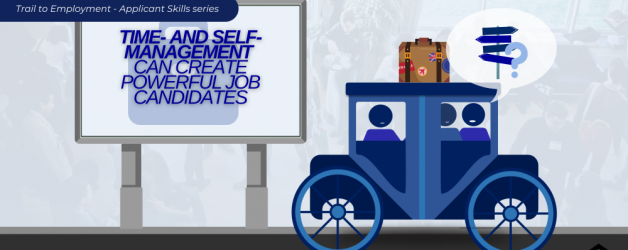Trail To Employment – Applicant Skills Series
Time- and Self-Management, as the name suggests, is a skill with two aspects: One is deciding how much time you allocate per task. The second is regulating your behaviour, motivating yourself and managing your stress. Time- and self-management characterise powerful job candidates. The CICan Innovation Fund Project Report introduces a fundamental element of time- and self-management: Setting your own goals. The discipline and determination required to pursue those goals strengthen your commitment to completing them. Coming up with a to-do list you can follow through, nurturing your integrity and singling out space for improvement. The benefits of time- and self-management include self-confidence, awareness and learning all positively characterising your future job profile.
The Erasmus Competence Booklet shows that what matters in principle is participating in activities that teach you how to be professional, proactive and take ownership. Academic curricula greatly contribute to teaching you time management. Presentations, assignments and exams teach how to act promptly before deadlines. Mentorship or buddy programmes give older students the role of welcoming first-year students or students coming from abroad, teaching them how to adjust to university life. Career orientation requires you to be well informed about the opportunities available for your career advancement, before taking a career step. This includes for instance feeling confident about which industry you want to work in. Proactive new hires plan each step of a sequence of tasks, mapping out the circumstances they consider to be conducive to their projects. Students who guide others with advice on how to prepare for examination periods or how to build good relationships with their roommates also gain leadership skills.
The Employer Manual of the Erasmus Career Project uses “self-efficacy” as an alternative term. Self-efficacy has to do with critically examining your thoughts and actions. When going abroad, you are given an incentive to engage in introspection. Immersed in a new culture, you begin to inquire about your own. Being in contact with a new worldview and lifestyle encourages you to investigate the narrative in which you grew up, and your role within it. This self-awareness can then occur in their academic environment and later in their workforce. Self-efficacy focuses on your setbacks and achievements. The actions you take whenever a challenge arises and to confront it and react to it allow you to become a determined new hire.
Communication; Adaptability; Problem-solving; Teamwork; and Time- and Self-management are the top skills employers seek. These skills surfaced in the employer interviews conducted by Expertise in Labour Mobility (ELM) within the CICan Innovation Fund Project. This blog series called Trail to Employment – Applicant Skills presents each of their respective functions using the metaphor of a carriage, the vehicle needed on the trail to employment. In doing so, we direct students considering going to an exchange or approaching graduation on their path to the job market. The series concludes with a post proposing different ways you can convincingly argue how your international experience contributed to the acquisition and cultivation of those skills.
To conclude our carriage metaphor, communication is the body, adaptability skills are the horses, problem-solving is the driver, and teamwork is the wheels. Time- and self-management can be seen as the passengers, making sure to board the carriage on time and prepare for the tasks they will tackle once reaching your destination. If you are a student who wants to know how you can display these skills, click on the next post!
Blog post written by Athina Tzanetou for Expertise in Labour Mobility
Images by Jizelle Ys for CareerProfessor.works
© 2024 CareerProfessor.works. All Rights Reserved.






